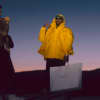Following a four year hiatus from music, Brandy ended a run on reality TV and returned her focus to recording this year, with a new record label and management team. Named for the date of Whitney Houston's death and Brandy's birth, Brandy regarded October's Two Eleven, her excellent sixth LP, as an opportunity for creative rebirth. She sought out a new roster of collaborators for the album, including a few producers who've found success in less polished realms, like Sean Garrett, Bangladesh and Mike Will Made It. Brandy's powerful voice has accumulated some wonderful husk over the years, and on Two Eleven she sings with carnal intensity, a potent match for the adventurous production. Speaking over the phone from Atlanta, she opened up about finding a new sound and renewed sense of purpose.
Most of the R&B records that have been well received this year have been applauded for moving away from R&B’s traditional template. Why do you think R&B as you've known it is struggling now? I really can’t put my finger on why it's struggling. But R&B is the genre of music where I come from and it speaks to me. So I really want to get back to that on Two Eleven, but I also wanted to do something fresh. That’s why I worked with so many different producers, from Bangladesh to Mike Will to Harmony [Samuels]. Those are people who really believe in R&B music but also who are open to giving it a new sound. I didn’t want this album to sound like any type of R&B that I had done in the past. I wanted to get something that people would relate to and give it like, a groove. When I heard “Put It Down,” I was just like, Yes. You hear the adlibs, you hear the harmonies, but you also hear this new fresh swag on it that I don’t think I’ve had in a while. I was going for that while still being versatile; we still have those kick-ass ballads from Rico Love, like “Hardly Breathing” and “No Such Thing as Too Late.” Those ballads still really touch home.
How did you like working with the younger guys? Mike Will is a character, because he’s so young and he knows what he wants. It’s interesting to see somebody that young who knows exactly what he wants, and for him to cross into another whole world with making R&B music. We were mixing and Justin Timberlake was in the studio, Timbaland, everybody was in there you know, just giving advice and giving love to the record. People were making their suggestions, and Mike Will didn’t care who nobody was! He was like, “Nuh-uh, that can’t go right there, this gotta go right here.” It wasn’t arrogant or cocky, he was just like “I know what I want, this is my record, I appreciate you Timbaland, but I gotta do me.” And I love that about Mike Will. I want to work with him again and keep that relationship because he’s so talented and he’s gonna be around for a long time. I hadn’t worked with Bangladesh before, but I’d heard his beats and before I even signed my deal [with RCA] I really wanted to meet him. Not one of his beats sounded the same as the last. I went to his studio and I sat right on the floor and just watched him. I was so mesmerized by his gift. He had another session with somebody else so I had to leave, but I didn’t want to leave.
You collaborated with Timbaland in 2009 for Shock Value II, where you rapped on two tracks under the name Bran'Nu. Why don’t you rap on Two Eleven? I just feel like that should have been left behind closed doors, even though I love to rap in my spare time. People are so used to me singing love songs, so it’s hard to accept the rap side of who I am. But I always tease my team, like, so Justin Bieber can rap and Chris Brown can rap and Lil Wayne can sing, but I can’t get my cadence on?
Were you discouraged by the sales of your last couple albums? I tried to find my way with Human, and I tried with Afrodisiac. When people start calling you a has-been, and the industry isn’t really supporting you in that way, no one’s beating down your door to give you a deal or even give you a song. I started to doubt myself, like, Okay, is this still my purpose? Is this still what I’m born to do? When you get to that point, where do you go, in your mind or in your spirit? Because you’re so broke. I did a show in LA, and felt almost like I had a chip on my shoulder, something to prove. I proved something to myself that night, and Bryan Prescott [of Chameleon Records, an RCA imprint] was in the audience and he saw it. Now I know music is what I’m supposed to do. I’m here to be of service. It’s really not about me, it’s about the people that I relate to, the people that love my music that need it to do whatever with it.
Is it tough to have to start over again, after so many years and a lot of success? It’s exhausting when people aren’t open, or when they want to compare your work now to what you’ve done before. It’s like, If y’all want the old stuff go buy the old stuff! Come on get on this train. [Two Eleven’s] all about the rebirth and the reinvention of who I am as an artist. I’m so proud of the work and I believe in it, finally. I haven’t had music that I believe in like this in a long time. I felt like this was my last shot to connect with, not only the fans that have been down for me, but to create a relationship with this new generation and reintroduce myself, as an artist and just as a person in general. I had been trying for so long and I wasn’t able to get it right. For this, it was a new team, a new label. Life is about constantly changing and evolving. Who wants to stay the same? I don’t want to stay the same way I was two years ago, musically or personally. I love singing in the studio: you can mess up and try again and hit the wrong notes and then try again. Creating an album, you get to discover things, discover a new version of yourself. Especially when you’re not really sticking with one producer or only one group of writers. When I got in the studio with Sean Garrett, who I had never worked with before, I felt like I had worked with him all my life. God has been great to me. I look forward to challenging myself.


